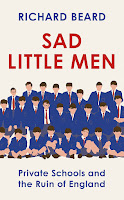As an adoptive father, I've read quite a lot of stuff to do with attachment and its lasting effects - how not having basic needs met at an early age can affect a child's physical development, their brain chemistry, their whole future. Beard's thesis is more about ideology, the institution shaping an outlook.
First, there's the long-term damage done by hiding how upsetting it was/is to be separated from parents and home; tears - his own or his mother's - were likely to be mocked. The result is more than empathy being seen as weakness.
"Don't make a fuss about nothing, and by refusing to fuss we turned the concerns of others into nothing. Everything could be nothing, up could be down, right could be wrong. The truth could be a lie and one thing could always be another." (p. 96)
Beard refers (after Andrew Motion) to the "skin" or outer later projecting what the child thinks others want to hear: letters home saying school is "fine" and "nice", perhaps even that it is better than being at home. This is a kind of masking, and I'm aware how damaging that can be. Masking takes effort and cannot be sustained; meltdowns and explosions often follow, apparently from nowhere. By encouraging masking, you encourage the eruptions.
Beard joins that idea of the "skin" to the way he was taught. It's telling that he feels such affinity with accounts of public school by George Orwell and Roald Dahl, the same experience and culture persisting over decades, whereas my brothers and I all had different experiences of being at the same school. One explanation for this is that few of Beard's teachers had qualifications; several had been through the same system and merely passed on what had been meted out to them. And what Beard was taught was a way to project himself, with confidence and long words. He was taught rhetoric, vocabulary, the primacy of Latin:.
"Aged thirteen, my diary reads as the prime minister speaks now, in his mid-fifties." (p. 101)
The ideas being taught were just as much about posture: history lessons that saw only confidence and glory in Empire; debates that "bravely" argued in favour of racism. These boys flirted with - even embraced - such ideas, because to say the supposedly unsayable is a show of strength.
I'm struck by what happens to those who flout the rules in these strict institutions. A young David Cameron went through a rebellious phase and was caught smoking spliffs.
"With drugs, as Cameron discovered, if the school caught us first we were beyond the reach of the law. In these instances the police were rarely involved, and therefore in the bigger picture we learned that for people like us the law was negotiable." (p. 165)
Right there, the indoctrination of "us" and "them".
It's a memoir, a personal take, and Beard admits that lockdown has restricted his ability to research the subject more widely. I'd have liked a bit more thoroughness in the presentation - page references for the books and papers he cites, interviews with the current staff rather than chance encounters as he walks the grounds, and a bit more science. But I'm really taken by his idea of how to measure a good school: not (just) in examination results but in the longer term, looking at later-life breakdowns, divorces and suicide, and damage inflicted on others.
The sense, I think, is of more than sad little men. The feeling is of an institutional hollowing out. There's an abysmal emptiness here, all mask and nothing within.








No comments:
Post a Comment